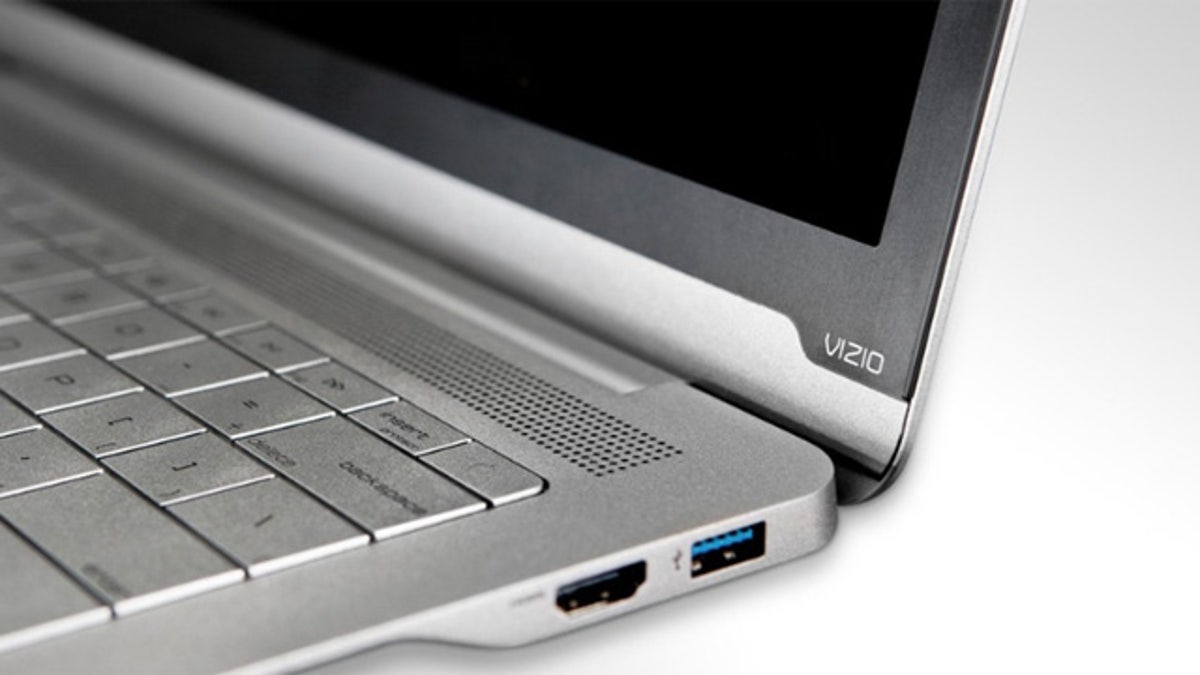
New offerings like these 'ultrabooks' from Vizio are fueling a resurgence in the laptop PC. (Vizio)
Laptop manufacturers whose underperforming products have been washed out of the market by a flood of tablets in recent years are finally fighting back.
Forget those crummy netbooks. Think of the new batch of systems as what laptops should have been from the very start: Functional. Powerful. Insanely great. And affordable.
It’s called the ultrabook. It’s the personal computer, and if you thought the PC was dead, you’d better think again.
“There hasn’t yet been a really stunning PC,” says Vizio CTO Matt McRae, whose company wants to change all of that.
Vizio dropped a bombshell on Monday at the 2012 Consumer Electronics Show in Las Vegas, announcing plans to jump into a market that other companies have been eager to get out of.
IBM spun off its PC division to Chinese company Lenovo five years ago, and HP, the world’s biggest PC maker, said it wanted out over the summer.
But now Vizio, the world’s No. 3 TV maker, wants in.
The company spent two years agonizing over the design of its first-ever computers, which feature metal cases stylish enough to make Apple designer Jonny Ive take notice. For what seems like the first time, a PC company has sweated the details. And Vizio isn’t alone.
“There’s a really impressive lineup of PCs on the market today,” Microsoft CEO Steve Ballmer said in a Monday night keynote at CES. There are 1.3 billion PCs in use across the planet, he said, but the newest crop are -- for the first time, really -- eye openers.
“The form factors are stunning,” he said.
“The PC … is a critical part of the home entertainment experience,” agreed Consumer Electronics Association President Gary Shapiro.
The rebirth of the PC is being spearheaded by a new low-power, high-performing (and still unnamed and unannounced) chip from Intel, design collaboration from Microsoft, and a half-dozen consumer electronics companies you may or may not have heard of.
Take, for example, Vizio, which on Monday unveiled the most stunning PCs of the show. The company’s lineup includes gorgeous laptops and all-in-one systems that Windows users will actually want to show off to their Mac-fanatic friends.
The company’s laptop will be among the most powerful on the market, McRae said, and with a metal case and full HD screen, it won’t disappoint the way an underperforming, cheap netbook did.
Vizio will also debut a slick all-in-one PC system. McRae noted the hand-forged aluminum support that connects the monitor to the notepad-sized base, which conceals a motherboard and hidden peripheral connections.
“This is the thing that took us nine months,” he told FoxNews.com.
Vizio’s lineup won’t be available until June, and the company hasn’t announced a name or a price – largely because it’s based on a forthcoming processor that hasn’t been announced yet.
But at CES, a half dozen other laptops that are thin, sleek and light -- companies are calling them “ultrabooks” -- were clear show highlights.
* Hewlett Packard, the world’s largest manufacturer of PCs, was eager to get out of the computer business earlier this year, but that hasn’t stopped it from debuting the Envy 14 Spectre, an arresting $1,400 slab of glass and metal. The company is targeting the top of the line, with a price tag higher than Apple’s MacBook Air.
* The Toshiba Protégé Z830 is the world’s lightest, Ballmer said during his keynote -- and smaller, lighter versions of the laptop are in the works.
* Acer kicked off CES with the announcement of the Aspire S5 Ultrabook, which the company called the thinnest of the new crop.
* Samsung has the fancy (and a touch pricey) Series 9 ultrabook. Ballmer called it “stunning – and less than 13 millimeters thick.” But the cheaper Series 5 is just as attractive, comes with a 13- or 14-inch screen -- and will start at $899.
The laptop market will likely change toward the end of the year, when Windows 8 is unveiled. The forthcoming operating system will feature an entirely new, touch-centric design deemed “Metro” and may drive touch screens and new hardware designs.
Ballmer noted that Windows 8 will be fully backward compatible with Windows 7.
“Every Windows 7 PC will be ready for Windows 8 on day one,” he promised.
Dude. You might be getting an ultrabook.
